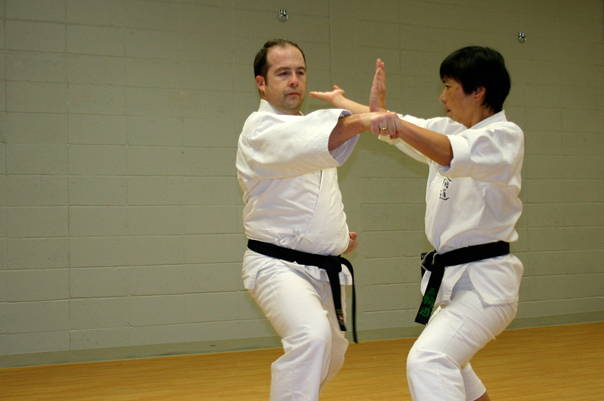The Silk Thread of Gorindo - Ottawa - Canada
Issue 16
- Twin Block - Chudan Kakiwake-uke
Photo cover "Roxanne Standefer sensei under the Bank Street Bridge - Ottawa" by ©2012 Claudio Iedwab
Dojo's Guidelines & Rules

The purpose of these rules is primarily to insure the safety and health of the students during the practice. Attention to these guidelines will also allow maximum benefit to be gained from your time in the dojo.
In general the dojo is considered to be the entire space that houses the School, including the training area, change rooms, lobby, etc. Of course the training room itself tends to be the more formal zone, but respect must be shown wherever you may be when training in Gorindo. By extension one can see that the dojo may exist in any structure, or on a beach, in the woods or a grassy field and still the same etiquette and ethic will apply.
Attitude
• Courtesy and the best behaviour are required at all times. The Martial Arts begin and end with courtesy, not in form alone but in heart and mind as well. In any dojo in the world there may be different customs, but if you open your eyes to what is around you and operate from an attitude of respect and humility you will not offend.
• Leave outside, along with your shoes, your worries, frustrations and anxieties of the day. When entering the dojo you must enter with the best intention of training. When you put on your gi you should do it with dedication and the wish to train seriously.
• Violence, aggression, excessive use of force, competitiveness or any disrespectful attitude will not be tolerated.
• Respect the quiet atmosphere of the dojo. Try to blend with what is going on. Remember that other students may require some time for contemplation, meditation, or quiet stretching, both before and after hard training. Noise or raucous frivolity should not occur in the dojo unless as part of the class. Refrain from idle chatter. Loud conversation and laughing in excess have no place in the dojo and show disrespect and arrogant attitude. Although conversation is natural in the change rooms, try to keep it to a low murmur. It should not be audible in the training area. Don’t forget that the dojo has its own rhythm and life that exists outside your usual class time, so respect that rhythm, in the same way that you will like to be respected.
• The Japanese word mokuso, indicates the time for meditation and its end is mokuso yame. These commands are shouted loudly and energetically before and after classes by sensei, and signify the beginning and the end of a silent moment throughout the dojo. This facilitates the focus and calm mind necessary for training. Please be aware and be listening for these commands regardless of where you are; if you are watching the class, in the stairs or in the dressing room, respect the silence and others’ class time. Try to observe this silence even if you are not in class. Regard this as part of your training, for the cultivation of vigilance and awareness is an important characteristic of the true martial artist.
• The teacher is referred to as sensei rather than by his first name alone, and you must always use words of courtesy and consideration while speaking.
• Any substitute teacher or assistant, sempai, shall be treated as your regular teacher.
• If you are unsure of what to do in a particular situation ask a senior student, or simply follow your senior’s lead, or just use common sense and respect. Don’t be resentful if you are corrected by your senior. Remember that they have a bigger picture in mind and in most cases are only concerned about your health and safety.
• Train with enjoyment but don’t be too easy with yourself, be alert against complacency. At the same time do not expect to learn even simple things instantly. Cultivate calmness of mind and do not become angry. Avoid abusive language. Know that one who is easily angered loses courage at important moments.
• You must train seriously from the very beginning. If you always practice with the idea in mind that someday you might have to teach what you are learning, your progress will improve.
• Do not be impatient when you learn. Words alone cannot explain, practice is necessary. Go back to basics.
• Be smart and listen to the experience of your sensei, or sempai. Accept their advice or correction with gratitude and respect those who are more experienced. They have walked this path before you and have much to offer. They are not trying to show off their knowledge to you, they are expected to assist you as part of the way of the dojo. Sometimes the truth behind their teachings is not readily apparent but patience, an open mind and practice will reveal it to you.
• Punctuality and regular participation in the classes is important to your individual progress as well as the collective spirit of the school.
• Exercise and promote such virtues as honour, loyalty, camaraderie, integrity, honesty and decency.
• All students are expected to be courteous and understanding.
• Advanced students are expected to set a good example to new students and to assist them whenever it is necessary. Be gentle and respectful when correcting beginners.
Maintain as much silence as possible. Silence is not only an aid to concentration, but it also enables everyone to hear and react instantly to the sensei’s commands and instructions. It is important to learn and be ready for the two Japanese words that you will hear quite often: hajime, (begin), and yame, (stop). To either one of these commands students must show immediate response regardless of what or where they are practicing in the dojo.
• In order to learn, students must remain open-minded and humble. Regard it as a honour to be invited to work with sensei, sempai or a higher level student. Higher belts are willing to collaborate with lower belts without taking advantage of their comparative inexperience. Helping another is often the best path to personal learning. Don’t waste their time, it is valuable to both of you.
• Don’t be afraid to make mistakes or errors, give yourself a chance to improve, no matter how long it takes to achieve your goal and always finish what you start. Do not compare yourself with others.
• Always imagine that you are facing an adversary who is faster, stronger, smarter and more skilled than you. Train in technique with the idea that you will not have a second chance or opportunity to 'try it again', make every instant a unique act, like drawing on a clean slate. In this way your self remains 'sharp', concentrating your mind and energy, and expressing your spirit to the maximum. This attitude will benefit other facets of your life as well.
• Never train with angry old feelings or anxiety in your practice. Regardless of your personal life, background or ideas, make an effort to control negative thoughts and don’t let them control you. Leave your bad waves outside, remember that you came to the dojo to solve conflicts not to build them up at the expense of others. This is not an easy task. A Zen master once said: ‘To study the self is to forget the self. To forget the self is to understand all things’.
by Claudio Iedwab & Roxanne Standefer
Originallly published in the Gorindo Student Manual by Claudio Iedwab & Roxanne Standefer
©2011 Photo by Claudio Iedwab
- Twin Block - Chudan Kakiwake-uke
« Click the Subscribe link on the left





